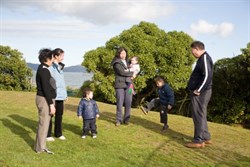- Home
- >
- Being Active
- >
- Parents and caregivers
Healthy eating and daily activity should be considered an essential part of a healthy lifestyle for all children and adolescents.
You can be a role model for your child to support healthy lifestyle behaviours and physical activity, and encourage your children to choose a physical activity they enjoy.

Being active doesn’t have to be expensive! Be creative, have fun and try to build activity into all of your day-to-day activities.
Learn about Department of Conservation family-friendly walks in Canterbury.
Christchurch Mums is an online place to get mums connected with each other and keep them up to date on things to do with kids in Christchurch.
Check out free or cheap things to do in Christchurch with kids.
Find family-friendly activities in your area with the Activity Search.
Find out about parks, playgrounds and swimming pools in our region.
Some events have the option for whānau to get active together - such as:
- participating as a parent and child team;
- parents supporting their child during the race;
- races covering the different age groups within the family; or
- discounted family entry fees.
Find out about some fun family friendly events in Canterbury.
Check out your local council website for upcoming local community and sports events - including "have a go" sessions.
Children love to run, jump, crawl, shoot, bounce and generally play outdoors, and there are some great toys available to make this time extra fun.
It's easy and affordable to make birthday and Christmas gifts active ones - simply include things like kites, balls, frisbees, water pistols and skipping ropes.
Get ideas on some outdoor toys for hours of fun (Kiwi Families).
Get ideas for outdoor play equipment for your family (Kiwi Families).
Here are some suggestions for parents and caregivers to encourage children to be more active and make healthy food choices:
- Keep TVs and other electronic entertainment devices in communal family areas rather than in children's bedrooms.
- Turn the TV off before family dinners and eat family meals together daily.
- Introduce rules regarding children's screen time (such as not during meals and setting TV-free times).
- Involve children in providing family meals including meal planning, shopping and food preparation.
- Use rewards other than unhealthy foods or screen-based entertainment to promote good behaviour.
- Eat breakfast – this research shows children are more likely to eat the recommended amounts of fruit and vegetable if their parents eat breakfast
- Encourage physical activity such as keep sporting equipment near the back door rather than packed away in cupboards
- Model healthy lifestyle behaviours and support children’s physical activity; encourage children to choose a physical activity they enjoy
- Use active transport such as walking or riding whenever possible - such as short trips to buy milk, walking or cycling to school
- Support independent play and travel; and encourage children to have unstructured physical activity and play alongside organised physical activity and sport.
- Challenge Diabetes
- Benefits of being active
- Recommended daily activity
- Easy ways to move more
- Getting started
- Support programmes
- Keeping motivated
- Karawhiua!
- Parents and caregivers
- Under fives
- Children and young people
- Older adults
- Active with a disability
- Active with a health condition
- Expecting and new mums

